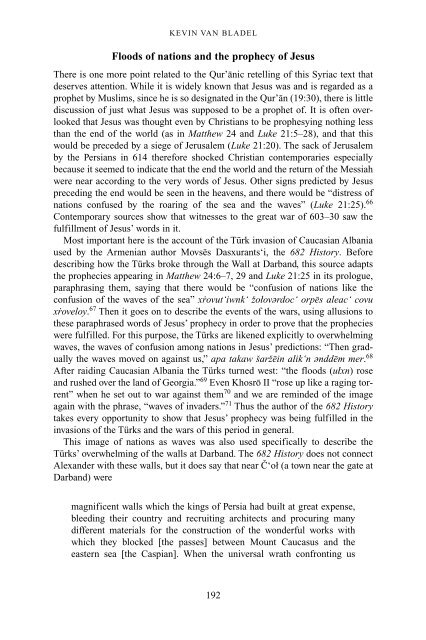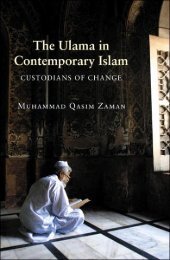The Qur'an in its historical context (pdf - Islam and Christian-Muslim ...
The Qur'an in its historical context (pdf - Islam and Christian-Muslim ...
The Qur'an in its historical context (pdf - Islam and Christian-Muslim ...
Create successful ePaper yourself
Turn your PDF publications into a flip-book with our unique Google optimized e-Paper software.
KEVIN VAN BLADEL<br />
Floods of nations <strong>and</strong> the prophecy of Jesus<br />
<strong>The</strong>re is one more po<strong>in</strong>t related to the Qur’anic retell<strong>in</strong>g of this Syriac text that<br />
deserves attention. While it is widely known that Jesus was <strong>and</strong> is regarded as a<br />
prophet by <strong>Muslim</strong>s, s<strong>in</strong>ce he is so designated <strong>in</strong> the Qur’an (19:30), there is little<br />
discussion of just what Jesus was supposed to be a prophet of. It is often overlooked<br />
that Jesus was thought even by <strong>Christian</strong>s to be prophesy<strong>in</strong>g noth<strong>in</strong>g less<br />
than the end of the world (as <strong>in</strong> Matthew 24 <strong>and</strong> Luke 21:5–28), <strong>and</strong> that this<br />
would be preceded by a siege of Jerusalem (Luke 21:20). <strong>The</strong> sack of Jerusalem<br />
by the Persians <strong>in</strong> 614 therefore shocked <strong>Christian</strong> contemporaries especially<br />
because it seemed to <strong>in</strong>dicate that the end the world <strong>and</strong> the return of the Messiah<br />
were near accord<strong>in</strong>g to the very words of Jesus. Other signs predicted by Jesus<br />
preced<strong>in</strong>g the end would be seen <strong>in</strong> the heavens, <strong>and</strong> there would be “distress of<br />
nations confused by the roar<strong>in</strong>g of the sea <strong>and</strong> the waves” (Luke 21:25). 66<br />
Contemporary sources show that witnesses to the great war of 603–30 saw the<br />
fulfillment of Jesus’ words <strong>in</strong> it.<br />
Most important here is the account of the Türk <strong>in</strong>vasion of Caucasian Albania<br />
used by the Armenian author Movses Dasxurants‘i, the 682 History. Before<br />
describ<strong>in</strong>g how the Türks broke through the Wall at Darb<strong>and</strong>, this source adapts<br />
the prophecies appear<strong>in</strong>g <strong>in</strong> Matthew 24:6–7, 29 <strong>and</strong> Luke 21:25 <strong>in</strong> <strong>its</strong> prologue,<br />
paraphras<strong>in</strong>g them, say<strong>in</strong>g that there would be “confusion of nations like the<br />
confusion of the waves of the sea” x˝ovut‘iwnk‘ Δo„ov7rdoc‘ orpes aleac‘ covu<br />
x˝oveloy. 67 <strong>The</strong>n it goes on to describe the events of the wars, us<strong>in</strong>g allusions to<br />
these paraphrased words of Jesus’ prophecy <strong>in</strong> order to prove that the prophecies<br />
were fulfilled. For this purpose, the Türks are likened explicitly to overwhelm<strong>in</strong>g<br />
waves, the waves of confusion among nations <strong>in</strong> Jesus’ predictions: “<strong>The</strong>n gradually<br />
the waves moved on aga<strong>in</strong>st us,” apa takaw marΔe<strong>in</strong> alik‘n 7nddem mer. 68<br />
After raid<strong>in</strong>g Caucasian Albania the Türks turned west: “the floods (u„xn) rose<br />
<strong>and</strong> rushed over the l<strong>and</strong> of Georgia.” 69 Even Khosro II “rose up like a rag<strong>in</strong>g torrent”<br />
when he set out to war aga<strong>in</strong>st them 70 <strong>and</strong> we are rem<strong>in</strong>ded of the image<br />
aga<strong>in</strong> with the phrase, “waves of <strong>in</strong>vaders.” 71 Thus the author of the 682 History<br />
takes every opportunity to show that Jesus’ prophecy was be<strong>in</strong>g fulfilled <strong>in</strong> the<br />
<strong>in</strong>vasions of the Türks <strong>and</strong> the wars of this period <strong>in</strong> general.<br />
This image of nations as waves was also used specifically to describe the<br />
Türks’ overwhelm<strong>in</strong>g of the walls at Darb<strong>and</strong>. <strong>The</strong> 682 History does not connect<br />
Alex<strong>and</strong>er with these walls, but it does say that near #‘o„ (a town near the gate at<br />
Darb<strong>and</strong>) were<br />
magnificent walls which the k<strong>in</strong>gs of Persia had built at great expense,<br />
bleed<strong>in</strong>g their country <strong>and</strong> recruit<strong>in</strong>g architects <strong>and</strong> procur<strong>in</strong>g many<br />
different materials for the construction of the wonderful works with<br />
which they blocked [the passes] between Mount Caucasus <strong>and</strong> the<br />
eastern sea [the Caspian]. When the universal wrath confront<strong>in</strong>g us<br />
192



